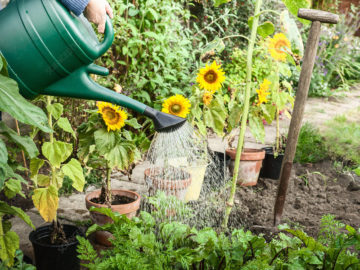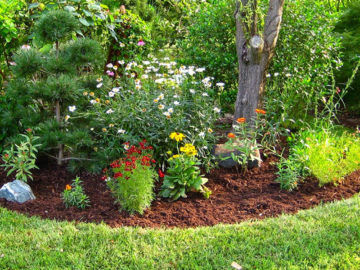When temperatures in the summer start creeping up, you’re not the only one who can get stressed. A lot of plants will suffer when the weather turns hot out. Irreversible damage can occur to the plant with decreased functions in growth, failure to flower, or failure to produce seeds. However, with adequate care, outdoor plants in the extreme heat, and the effects of heat stress can be minimized.
 While some plants, like succulents, are well equipped with handling heat by conserving water in their fleshy leaves, the majority of plants do not have this luxury. Therefore, they will normally suffer from the heat in some way or other. Generally, heat stress of a plant will show itself by wilting, which is a sure sign that water loss has taken place. If this is ignored, the condition will worsen, as the plants will eventually dry up, turning a crunchy brown before dying. Many plants will actually shed some of their foliage in an attempt to conserve water. (this is called leaf drop)
While some plants, like succulents, are well equipped with handling heat by conserving water in their fleshy leaves, the majority of plants do not have this luxury. Therefore, they will normally suffer from the heat in some way or other. Generally, heat stress of a plant will show itself by wilting, which is a sure sign that water loss has taken place. If this is ignored, the condition will worsen, as the plants will eventually dry up, turning a crunchy brown before dying. Many plants will actually shed some of their foliage in an attempt to conserve water. (this is called leaf drop)
The care of plants and flowers in hot weather is pretty much the same with exception to container plants, or those that have been newly planted. Of course, additional watering is a given, with new and potted plants requiring even more moisture, perhaps even twice a day in high temperatures. These plants should be given a thorough soaking until water can be seen running out from the drainage holes. In addition to watering more often, mulching outdoor plants can help conserve moisture and keep plants cooler. The use of shade covers, especially on vegetable crops, may be helpful as well.
All living things experience stress, and your plants are no exception. A little bit of stress can actually be good for the plant. Proper pruning, for example, can encourage new growth and thin the plant to allow sunlight to reach the innermost leaves and flowers that are otherwise shaded. Too much stress, however, can be fatal. The best way to help a plant recover from stress is to keep it as healthy as possible. Healthy plants are often able to rebound on their own after an unexpected problem occurs – such as extreme heat or wind stress.

- Providing copious amounts of water and shade to limp, wilting plants that have suffered heat stress is a must.
- Spreading organic mulch around your plants whenever temperatures are expected to be high can help preserve water retention.
- Awnings and canopies can provide temporary shade during unusually hot periods while arbors and trellises offer more permanent protection for plants located in less than ideal environments.


